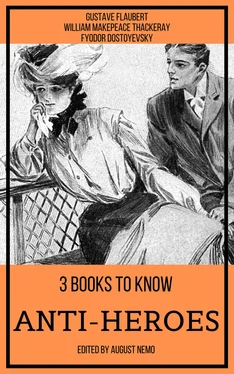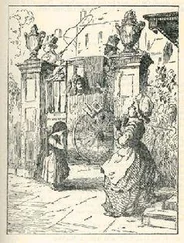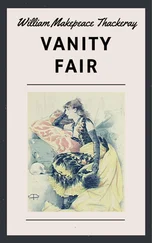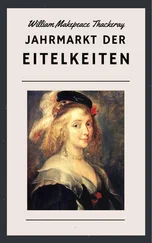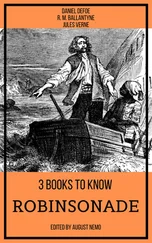At our table at the inn there was a Prussian officer who treated me with great civility, and asked me a thousand questions about England; which I answered as best I might. But this best, I am bound to say, was bad enough. I knew nothing about England, and the Court, and the noble families there; but, led away by the vaingloriousness of youth (and a propensity which I possessed in my early days, but of which I have long since corrected myself, to boast and talk in a manner not altogether consonant with truth), I invented a thousand stories which I told him; described the King and the Ministers to him, said the British Ambassador at Berlin was my uncle, and promised my acquaintance a letter of recommendation to him. When the officer asked me my uncle’s name, I was not able to give him the real name, and so said his name was O’Grady: it is as good a name as any other, and those of Kilballyowen, county Cork, are as good a family as any in the world, as I have heard. As for stories about my regiment, of these, of course, I had no lack. I wish my other histories had been equally authentic.
On the morning I left Cassel, my Prussian friend came to me with an open smiling countenance, and said he, too, was bound for Dusseldorf, whither I said my route lay; and so laying our horses’ heads together we jogged on. The country was desolate beyond description. The prince in whose dominions we were was known to be the most ruthless seller of men in Germany. He would sell to any bidder, and during the five years which the war (afterwards called the Seven Years’ War) had now lasted, had so exhausted the males of his principality, that the fields remained untilled: even the children of twelve years old were driven off to the war, and I saw herds of these wretches marching forwards, attended by a few troopers, now under the guidance of a red-coated Hanovarian sergeant, now with a Prussian sub-officer accompanying them; with some of whom my companion exchanged signs of recognition.
‘It hurts my feelings,’ said he, ‘to be obliged to commune with such wretches; but the stern necessities of war demand men continually, and hence these recruiters whom you see market in human flesh. They get five-and-twenty dollars from our Government for every man they bring in. For fine men—for men like you,’ he added, laughing, ‘we would go as high as a hundred. In the old King’s time we would have given a thousand for you, when he had his giant regiment that our present monarch disbanded.’
‘I knew one of them,’ said I, ‘who served with you: we used to call him Morgan Prussia.’
‘Indeed; and who was this Morgan Prussia?’
‘Why, a huge grenadier of ours, who was somehow snapped up in Hanover by some of your recruiters.’
‘The rascals!’ said my friend: ‘and did they dare take an Englishman?’
‘’Faith this was an Irishman, and a great deal too sharp for them; as you shall hear. Morgan was taken, then, and drafted into the giant guard, and was the biggest man almost among all the giants there. Many of these monsters used to complain of their life, and their caning, and their long drills, and their small pay; but Morgan was not one of the grumblers. “It’s a deal better,” said he, “to get fat here in Berlin, than to starve in rags in Tipperary!”’
‘Where is Tipperary?’ asked my companion.
‘That is exactly what Morgan’s friends asked him. It is a beautiful district in Ireland, the capital of which is the magnificent city of Clonmel: a city, let me tell you, sir, only inferior to Dublin and London, and far more sumptuous than any on the Continent. Well, Morgan said that his birthplace was near that city, and the only thing which caused him unhappiness, in his present situation, was the thought that his brothers were still starving at home, when they might be so much better off in His Majesty’s service.
‘“‘Faith,” says Morgan to the sergeant, to whom he imparted the information, “it’s my brother Bin that would make the fine sergeant of the guards, entirely!”
‘“Is Ben as tall as you are?” asked the sergeant.
‘“As tall as ME, is it? Why, man, I’m the shortest of my family! There’s six more of us, but Bin’s the biggest of all. Oh! out and out the biggest. Seven feet in his stockin-FUT, as sure as my name’s Morgan!”
‘“Can’t we send and fetch them over, these brothers of yours?”
‘“Not you. Ever since I was seduced by one of you gentlemen of the cane, they’ve a mortal aversion to all sergeants,” answered Morgan: “but it’s a pity they cannot come, too. What a monster Bin would be in a grenadier’s cap!”
‘He said nothing more at the time regarding his brothers, but only sighed as if lamenting their hard fate. However, the story was told by the sergeant to the officers, and by the officers to the King himself; and His Majesty was so inflamed by curiosity, that he actually consented to let Morgan go home in order to bring back with him his seven enormous brothers.’
‘And were they as big as Morgan pretended?’ asked my comrade. I could not help laughing at his simplicity.
‘Do you suppose,’ cried I, ‘that Morgan ever came back? No, no; once free, he was too wise for that. He has bought a snug farm in Tipperary with the money that was given him to secure his brothers; and I fancy few men of the guards ever profited so much by it.’
The Prussian captain laughed exceedingly at this story, said that the English were the cleverest nation in the world, and, on my setting him right, agreed that the Irish were even more so. We rode on very well pleased with each other; for he had a thousand stories of the war to tell, of the skill and gallantry of Frederick, and the thousand escapes, and victories, and defeats scarcely less glorious than victories, through which the King had passed. Now that I was a gentleman, I could listen with admiration to these tales: and yet the sentiment recorded at the end of the last chapter was uppermost in my mind but three weeks back, when I remembered that it was the great general got the glory, and the poor soldier only insult and the cane.
‘By the way, to whom are you taking despatches?’ asked the officer.
It was another ugly question, which I determined to answer at hap-hazard; and so I said ‘To General Rolls.’ I had seen the general a year before, and gave the first name in my head. My friend was quite satisfied with it, and we continued our ride until evening came on; and our horses being weary, it was agreed that we should come to a halt.
‘There is a very good inn,’ said the Captain, as we rode up to what appeared to me a very lonely-looking place.
‘This may be a very good inn for Germany,’ said I, ‘but it would not pass in old Ireland. Corbach is only a league off: let us push on for Corbach.’
‘Do you want to see the loveliest woman in Europe?’ said the officer. ‘Ah! you sly rogue, I see THAT will influence you;’ and, truth to say, such a proposal WAS always welcome to me, as I don’t care to own. ‘The people are great farmers,’ said the Captain, ‘as well as innkeepers;’ and, indeed, the place seemed more a farm than an inn yard. We entered by a great gate into a Court walled round, and at one end of which was the building, a dingy ruinous place. A couple of covered waggens were in the court, their horses were littered under a shed hard by, and lounging about the place were some men and a pair of sergeants in the Prussian uniform, who both touched their hats to my friend the Captain. This customary formality struck me as nothing extraordinary, but the aspect of the inn had something exceedingly chilling and forbidding in it, and I observed the men shut to the great yard-gates as soon as we were entered. Parties of French horsemen, the Captain said, were about the country, and one could not take too many precautions against such villains.
Читать дальше
